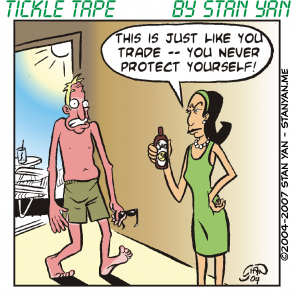When your money is on the line, you can’t help but act cautiously. You don’t want to impulsively gamble with your account, dig yourself into a financial hole, and need to work twice as hard just to break even. On the other hand, you don’t want to stagnate. Winning traders are carefree when making trades. They don’t strive for an unrealistic level of perfection. They take action, solve problems as they come, and most importantly, make trades.
In many professions, striving for perfectionism is rewarded. Studies of ambitious, successful people, for example, have illustrated that they will persistent at completing a task until their relatively high standards are met, but they don’t overdo it to the point of procrastination. They set a specific standard, and once they reach it, they complete the task and move on. Many people, however, are afraid to put their ego on the line and possibly feel humiliated by failure.
In his book, “Trading in the zone,” Mark Douglas notes that novice traders find reasons to avoid executing trades. They may convince themselves that they may need to learn new trading strategies, for example. But these excuses are often just ways to avoid taking responsibility for putting on a trade. They would rather mull over a trading decision than executing a trade and facing their limitations. It is vital for traders to take action, though. Shrinking back from a challenge can never lead to success. That said, it’s quite natural to want to make sure everything is just right before executing a trade. How many times have you failed to account for a potential adverse event and paid the price? Through hard knocks, you’ve learned the virtues of extreme caution. But, in the end, you also know you must take action. You must accept responsibility, and make a trade.
How can you ease the pressure of taking risks? First, the obvious solution is to minimize potential losses through risk management. If you limit the amount of risk to only a small percentage of your account, you will really feel that you have little to lose. Second, don’t imbue a trade with more emotional significance than it’s worth. It isn’t your baby; it’s just your job. If you look at it from an objective, businesslike perspective, you’ll feel more relaxed and will be able to make the trade more easily. Third, from a purely psychological standpoint, you must be willing to accept the fact that trading outcomes are uncertain.
You’ll never truly know how a trade will turn out unless you execute it and find out what happens. It’s hard to face the consequences at the time, but it’s all part of the learning experience. It may be unpleasant to find out just how hard trading can be, but you’ll find that in the long run, if you take personal risks, minimize the real financial consequences, and learn from your mistakes, you’ll master the markets. And all the psychological pain you had to endure in the process of learning was well worth it. So don’t be afraid to take the plunge. As long as you’re not risking money you cannot afford to lose, you’ll be building up a repertoire of trading experiences that will ensure you are on the path to success.


